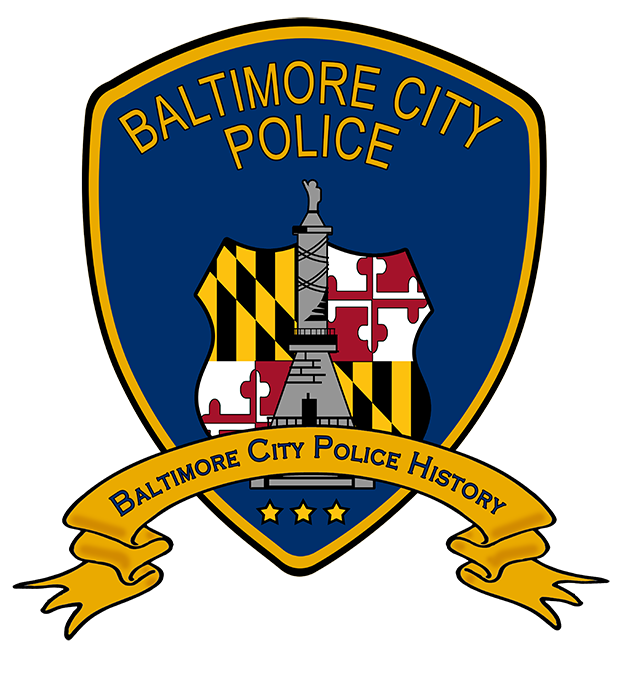FOP History
 History of FOP Lodge #3
History of FOP Lodge #3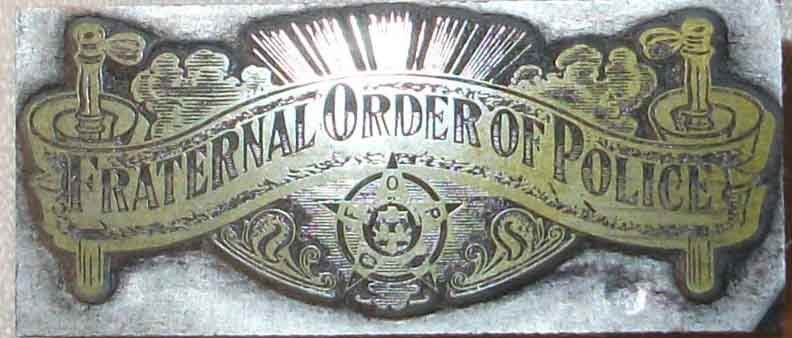
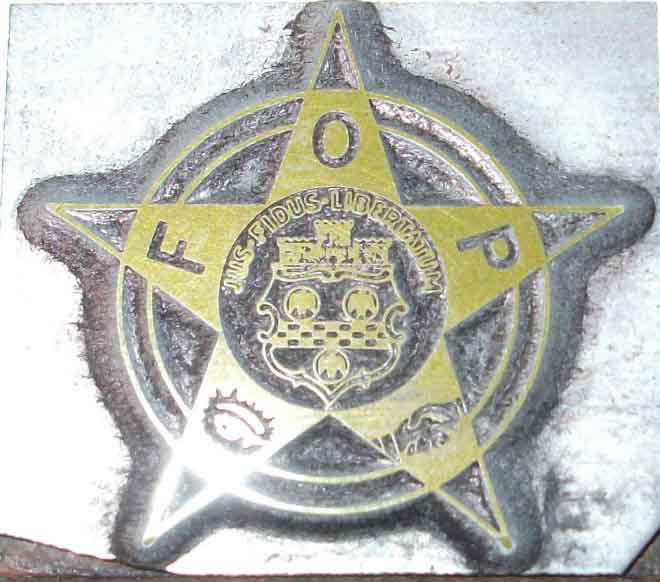
These are Old Brass Printers Plates for FOP Letterheads and Envelopes
FOP Stamps Some background History on the FOP Logo
The five-cornered star reminds us of the allegiance we owe to our Flag it is a symbol of the authority with which we are entrusted. It is an honor the people we serve bestow upon us. They place their confidence and trust in us to do the right thing, and to be there when called upon; we are to serve them proudly.
Midway between the points, and center of the star is a blue field representative of the thin blue line protecting those we serve.
The points are of gold, to indicate the position of which we are now serving.
The background is white, the unstained color representing the purity with which we should serve.
We shall not let anything corrupt be injected into our order.
Therefore, our colors are blue, gold and white.
The open eye is the eye of vigilance, ever looking for danger and protecting all those under its care while they sleep, or while awake.
The clasped hands denote friendship. The hand of friendship is always extended to those in need of our comfort.
The circle surrounding the star midway indicates our never-ending efforts to promote the welfare and advancement of this order.
Within the half circle over the centerpiece is our motto, "Jus, Fidus, Libertatum" which translated means "Law is a Safeguard of Freedom."
Some have given "The Thin Blue Line" a negative meaning; They think it means police stick together (lie for each other, cover-up for each other and partake in corruption for each other; The truth is, The Thin Blue Line refers to the low number of police officers that form a line between the "Good Things in Society" so we can protect them from the "Bad Things in Society ".
In most departments the police are outnumbered by as many as 100 to 1 or more, that is to say for every officer on the beat, there could be as many as 100 people he is responsible for protecting, and 99% of our police will put their lives on the line to live up to their oath to protect that 100 or more people.
During the Decency Rally in 1969, Police were outnumbered by as many as 200 to 1 while packed into Memorial Stadium before fights and other assaults, took place through the stadium which nearly leads to riots. This isn't much different from the riots of 1861, and the riots of 1968 when police were outnumbered, but The Thin Blue Line of the Baltimore Police Department's FOP Lodge #3 will always stand tall, never back down, and will always manage to get the job done.
![]()
How it all Started
The Eulogy for Richard Allen "Dick" Simmons
as read by Earl Kratch at his Memorial Service
Sunday on August 18th, 2013
RICHARD ALLEN SIMMONS – Some called him Richard or Rick or Dad, but on the job, we called him Dick. He was a true Baltimore City Police Officer. He handled himself well. In his younger years as a beat walking Patrolman, you could tell when he was working on what was happening in his post. When he worked, there was no loitering in front of his bars, drug store or any other businesses or corners. He kept them clear.
I came to know Dick back in the early 60’s when he was a footman in the Eastern District and I was a Headquarters Narc. We had conversations of our objections of the Baltimore City Police were represented by a labor union, instead, we wanted to be associated with a professional law enforcement organization, that being the Fraternal Order of Police. During this time period, there was a group of Baltimore City Police Wives who spoke out on issues within the police department. We had feared at that time of retaliation if we spoke out. Dick’s first wife Anne Simmons was a member of that group and they contacted the National Fraternal Order of Police President John Harrington who was also the President of the Philadelphia Pennsylvania City Lodge #5. He along with Pennsylvania National Trustee Steve Condos (A Pennsylvania State Trooper) came to Baltimore, met with us and this was the beginning of the Fraternal Order of Police, Baltimore City Lodge #3 being formed. Dick became our first President and I became the Treasurer.
Not having payroll deduction for collecting dues at that time, we would go to the districts and headquarters collecting dues on payday – not an easy task. John Harrington put us in touch with a Don Sloane who did the Philadelphia Lodge #5 fundraising – solicitation of funds for Associate Membership which put Associate Membership car medallions on the streets of Baltimore.
The Police Union at that time found a way to get us bad press and they contacted the Baltimore Sun Papers – the paper ran a story showing our FOP Associate Membership car medallion stating that this medallion would get the person out of speeding tickets and parking tickets in Baltimore City. Our attorney who was with us from day one, Sidney Schlachman contacted Dick and me, telling us that we had problems. That we where to meet him at City Hall for a meeting at 1 P.M. that day. That the possibility existed that we may be fired. We got our ass whipped and was instructed to cease and desist the program, which we did. We then went to a bi-yearly magazine publication with another promoter who did solicitation for adds to put out the magazine.
Back in 1967, John Harrington informed us about the Grand Lodge FOP National Conference that was to take place in August 1967 in Miami Beach, Florida. Dick and I, along with our families, and at our own expense, attended this conference. We where the only delegates registered at this conference from Maryland. At this conference, we found that if we formed a Maryland State Lodge with three Maryland Local Lodges, we could have a National Trustee on the Grand Lodge Board of Directors. We came back and with some research, found that there was two other Maryland Local Lodges – Hagerstown Lodge # 88 and Prince Georges County Lodge # 89. Back in the beginning, the Grand Lodge assigned the numbers. Nationwide in the order, the local lodges were formed. Thus, Hagerstown was the 88th FOP Lodge that was formed and Prince George’s County #89 was formed next.
On November 8th, 1967, Dick, I and our attorney Sidney Schlachman, traveled to the Hagerstown Lodge #88 Club House, meeting with them and Prince George’s County Lodge #89. At which time National President John Harrington formed the Fraternal Order of Police, Maryland State Lodge. Note; at this time we were unaware of the existence of the Cumberland Lodge #90. With this, Dick became the first Maryland National Trustee. I became the Treasurer.
This was the start of the growth of Fraternal Order of Police in Maryland. People like Dick Simmons, Bill Giffin and Ralph Ryland from Hagerstown, I and others later on like Les Bates from Anne Arundel County Police expanded Maryland FOP to what is today, with around 20,000 members in over 60 local lodges. All this came about because of people like Dick Simmons who had dreamt of an FOP.
Dick Simmons, Ralph Ryland, Les Bates, I and others have lived for the existence of the FOP. To the time of Dick’s death, he was in contact with me at least 2 to 3 times a week talking to me about FOP business. A little over a year ago, FOP, Maryland State President John “Rodney” Bartlett presented Dick Simmons the top award that a member could receive from the Fraternal Order of Police, Maryland State Lodge, that being the Lifetime Achievement Award. The emotions shown by Dick was that of one of the peaks of his FOP life. He was very humble to be recognized by his peers. This plaque is presently on display at this gathering.
Richard Allen Simmons was known to some as "Rick" and to others, as "Dick" still others called him "Dad" but to the BPD he was "Mr. FOP" from Maryland. May he Rest In Peace. Some stories about forming Lodge #3 and other Lodges in the area
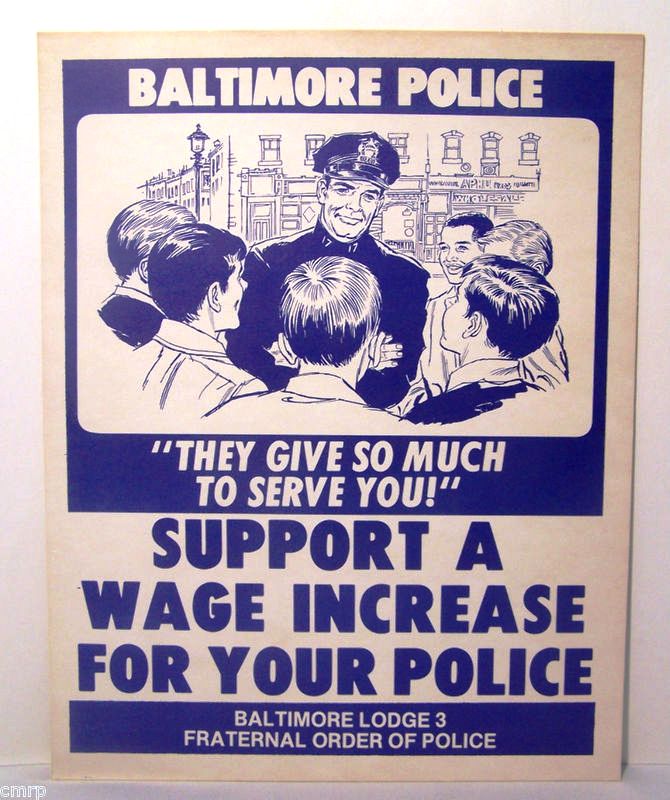 An Adventurous Trip
An Adventurous Trip
by Earl Kratch
To say the least, being involved in forming Fraternal Order of Police in Maryland has been an adventurous trip. First with the formation of Baltimore City Lodge #3 and then the Maryland State Lodge. But, we didn't stop there. "Dick", myself along with Ralph Ryland and then Les Bates and others that came along, reached out to other agencies in Maryland, forming them into local FOP Lodges. Most of them were the same old story, them being scared of the administration retaliating against them. Dick and I put many a mile on my car, forming lodge after lodge. Looking back over the years, I counted twenty-nine local Maryland Lodges that I was primarily involved with or assisted in forming. While working in the Narcotic Unit, working along with Baltimore County Police detectives, and just after we formed Baltimore City Police Lodge #3; I talked to some of the Detectives in the Baltimore County Police Department and they showed interest in forming a local FOP Lodge. I then went back to "Dick" who was now our Maryland State Lodge National Trustee - - - thus we formed FOP Baltimore County Police Lodge #4. And it kept on going as the FOP was becoming a wave across Maryland. On a funny note, I along with then Maryland FOP State President Les Bates, where going to meet with a group that wanted to form a local lodge. On the way, driving through Charles County, we came across a uniformed Charles County Deputy Sheriff, directing traffic in the pouring down rain getting soaked and wet as he had no rain gear. Les stopped his police car, opened his trunk and removed an Arundel County Police Department raincoat. He gave it to the deputy that was standing in the rain directing traffic asking him why his agency didn't supply him with a raincoat - - - thus we started another lodge, that being Fraternal Order of Police, Charles County Lodge #24. I am so blessed with having had the opportunity to have come in contact with so many law enforcement personnel, that have become my fraternal brothers and sisters. These brothers and sisters have the same goals as I, that of giving their all, making Maryland law enforcement an honorable recognized profession with proper benefits.
Thank You! Fraternally / Sincerely, Earl...

Presidents of FOP's Lodge #3
Richard Simmons 1966-1973
Gus Drakos (deceased) 1974-1980
John Laufert (deceased) 1980-1986
Edwin Boston 1986-1990
Don Helms 1990-1992
Leander "Bunny" Nevin 1992-1994
Gary McLhinney 1994-2003
Daniel J. Fickus 2003-2004
Frederick V. Roussey 2004-2006
Paul M. Blair, Jr. 2006-2008
Bob Cherry 2008 - 2014
Gene S. Ryan 2014 - 2018
Mike Mancuso 2018 - Present
![]()
24 Feb 1967
Police Bill Introduced
It Urges Recognition of Fraternal Order Lodge
Annapolis, February 23, 1967 – A bill to direct Donald D. Pomerleau, Baltimore Police Commissioner, to recognize the Fraternal Order of Police as the “Official Representative” of members of the force was introduced in General Assembly Today. Already pending is a rival measure designed to force recognition of a non-striking AFL-CIO union local of Baltimore police patrolman and sergeants.
Sen. Paul A. Dorf (D., 5th Baltimore) introduced the, "Fraternal Order Bill" “by request, as marked. He said he put it in at the request of those trying to get recognition for a Baltimore Lodge of the Fraternal Order, a national organization that claims more than 60,000 members. Furthermore, he said he agreed to lend his name to the measure so that he and his fellow Baltimore legislators could get, “all the issues on the table” when the rival bill comes up for hearings. The AFL – CIO measure, now before the House Judiciary Committee, does not mention “Union” union name.
It specifies that if most of the Sergeants and Patrolman, in the department decide by secret vote to designate an “Organization” to represent them, the Police Commissioner must deal with that union on such questions as Hours, Working Conditions and Grievances. The Fraternal Order Bill reads, in part: “The Police Commissioner of Baltimore City police shell allow the members of the Baltimore City Police Department to form and join a local lodge other Fraternal Order of Police, said organization to be established and recognized for the following purposes: “To better the existing conditions of policemen; for advancing social and educational undertaking in the department deciding among policemen; to encourage an amicable and official relationship, protection and cooperation among police officers; to provide fellowship among police officers… “The said local lodge so organized shall act as the official representative of the members of the Baltimore City Police Department.”
![]()
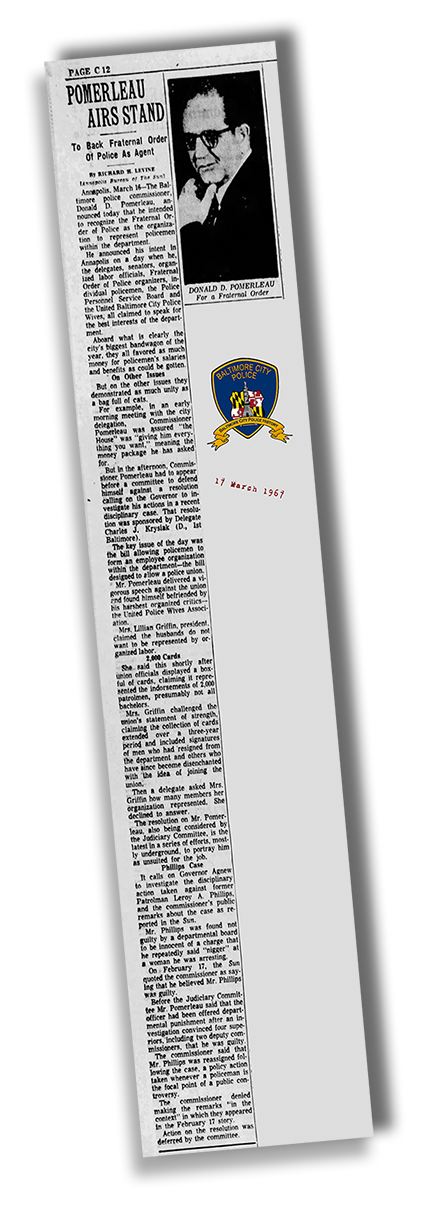 CLICK PIC ABOVE or HERE
CLICK PIC ABOVE or HERE
Donald D. Pomerleau Airs His Stand
To Back Fraternal Order of Police as Agent
17 March 1967
Annapolis, March 16 – The Baltimore Police Commissioner Donald D. Pomerleau, announced today that he intends to recognize the fraternal order of police as the organization to represent policeman within Baltimore’s Police Department.
He announced this intent in Annapolis on a day when he, the delegates, senators, organize labor officials, the Fraternal Order of Police organizers, individual policeman, the police personnel service board and the United Baltimore City Police Wives, all claim to speak for the best interest of the department.
A board that is clearly the city’s biggest bandwagon of the year, they all favorite as much money for policeman salary and benefits as could be gotten.
On Other Issues
But on other issues, they demonstrated as much unity as a bag full of cats. For example, in an early morning meeting with the city delegation, Commissioner Pomerleau was a sword “the house” was “giving him everything you want,” meaning the money package he had asked for.
But in the afternoon, Commissioner Pomerleau had to appear before a committee to defend himself against a resolution calling on the governor to investigate his actions in a recent disciplinary case. That resolution was sponsored by delegate Charles Jake. Krysiak (D., 1st Baltimore).
The key issue of the day was the bill allowing policemen to form an employee organization within the department – the bill designed to allow a police union. Mr. Pomerleau delivered a figure of speech against the union and found himself befriended by his hardest organized critics – the United police wives Association. Mrs. Lillian Griffin, the president claimed the husband’s do not want to be represented by organized labor.
2000 Cards
She said this shortly after union officials displayed a boxful of cards, claiming it represented the endorsements of 2000 patrolman, presumably not all bachelors. Mrs. Griffin challenged the union statement of strength, claiming the collection of cards extended over a three-year period and included signatures of men who would be resigned from the department and others who have since become disenchanted with the idea of joining the union.
Then a delicate asked Mrs. Griffin how many members her organization represented. She declined to answer. The resolution on Commissioner Pomerleau, also being considered by the judiciary committee, is the latest in a series of efforts, mostly underground, to portray him as unsuited for the job.
Phillips Case
Incalls on Gov. Agnew to investigate the disciplinary action taken against for patrolman Leroy a. Phillips, and the commissioner's public remarks about the case as reported in the sun. Mr. Phillips was found not guilty by the departmental board to be innocent of all charges that he repeatedly said “Nager” at a woman he was arresting.
On the 17th of February, the Sun quoted the Commissioner as saying that he believed Mr. Phillips was guilty. Before the judiciary committee, Mr. Pomerleau said that the officer had been offered departmental punishment after an investigation convinced four supervisors, including two deputy commissioners, that he was guilty.
The Commissioner said that Mr. Phillips was reassigned following the case, a policy action taken whenever a policeman is the focal point of a public controversy. The Commissioner denied making the remark “in the context” in which they appeared in the February 17 story. An action on the resolution was deferred by the committee.
![]()
In the Line of Fire
A Veteran Cop faces his Toughest Opponent: City Hall
By Evan Serpick
Credit: David Colwell
The Baltimore City Fraternal Order of Police Lodge 3 in Hampden is a part clubhouse, part HR office. In one room, officers go over paperwork regarding leave time and benefits. In the next, a neon police car hangs over a bar where off-duty cops swig beer and watch SportsCenter.
Upstairs, FOP president Bob Cherry toils in a busy but tidy office. A Norman Rockwell poster that shows a kind cop stooping down to help a little boy hangs behind his desk. On the floor are stacks of paperwork, some of them related to the union's long-standing struggle with City Hall over police pensions. Others, research about accidental police shootings. Cherry, who's been a cop for 18 years, always wanted to work in law enforcement.
"The model of public service was put in me as a kid," says Cherry, who grew up in a working-class town south of Boston and still has the Southie accent to prove it. "I believe that there are some folks who have that calling."
Unlike most cops, Cherry spent years working with inner-city kids before he joined the force. After graduating from Boston College, he worked as a case manager and team leader for Baltimore's Choice program, which provides outreach and support for troubled young people. For three years, he counseled and tracked kids in Cherry Hill and East Baltimore.
"It was frustrating," says Cherry, who has lived in Baltimore City since 1990. "All these kids, their neighborhoods were ravaged by poverty, no jobs, drugs everywhere—the one avenue where you would hope they would get some security would be school and, back then, they were pretty bad."
Still, Cherry fell in love with the city.
"It's like Boston: the blue-collar, tight-knit neighborhoods," he says. "I realized that this is a city that I want to work to improve."
In 1993, Cherry became a police officer, quickly rising through the ranks, working on the Violent Crimes Task Force, and ultimately, as a detective in the homicide division. In 2008, his colleagues in the FOP elected him their president, taking him off the streets.
It's been an eventful three years. The recession and cuts in the city budget have meant near-constant battles with City Hall over salary, benefits, and pensions. Three police officers were killed in the line of duty in the past year. And this year has brought a string of controversial incidents, including an accidental police-on-police shooting in January and the arrest of 19 officers in an alleged extortion scheme in February.
"I wish I was back on homicide," says Cherry—not at all kidding. "It's hard to keep everyone happy up here, whether you're dealing with City Hall, command staff, or even the men and women who you represent."
Relations with the City Council and Mayor Stephanie Rawlings-Blake headed south last year when the council drastically cut city contributions to police pensions, reduced benefits, and eliminated tuition reimbursement.
Cherry was particularly miffed that the mayor helped kill a bill allowing the city and the FOP to enter binding arbitration and shot down an FOP counter-proposal to the city's changes in the pension plan that, he says, would have matched City Hall's cuts.
"You show up at our officers' funerals and say 'good job.' You go on TV and talk about the reduction in crime and say 'good job.' But you won't sit down with us who, though we disagree, have come a lot further than unions across the country," he says. "It's unfortunate."
Ryan O'Doherty, a spokesperson for the mayor, says the pension legislation included many fiscally responsible compromises.
"The mayor was concerned about getting the pension system funded so it would be there when police officers and firefighters need it," says O'Doherty. "Bob Cherry was more concerned about keeping a system where government employees retire in their early 40s with a full pension after 20 years."
It got so bad that the FOP filed a federal lawsuit against the city and helped pay for billboards that read: "Welcome to Baltimore. Home to a Mayor & City Council who turned their backs on our police and firefighters."
"It's frustrating that I have a strained relationship with folks at City Hall," says Cherry, who hasn't talked to the mayor in six months. "I think we can bring a lot to the table."
Cherry is looking into a performance-based contract for cops, like the one the Baltimore Teachers Union recently signed.
"There's less money going around," says Cherry, who's a fan of ousted D.C. schools chancellor Michelle Rhee, who also favored performance-based contracts. "We have to find ways to streamline our services without giving up on the goal of public safety."
Above all, says Cherry, his most important priority is making sure his fellow police officers get the respect they deserve.
"There are a lot of intelligent, hard-working men and women in the Baltimore Police Department that can make Baltimore a stronger place," he says. "I love representing them."
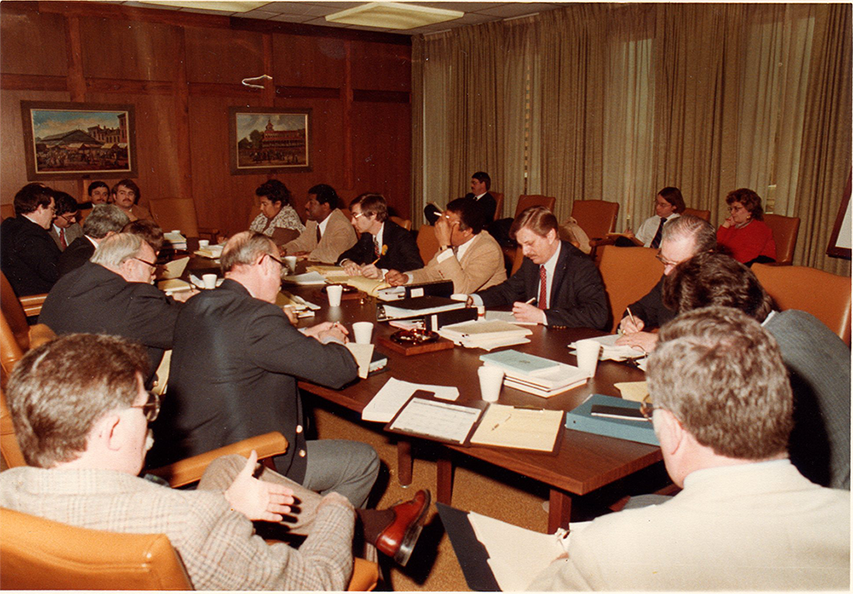 Courtesy Tom Douglas
Courtesy Tom Douglas
Contract Negotians3-15-84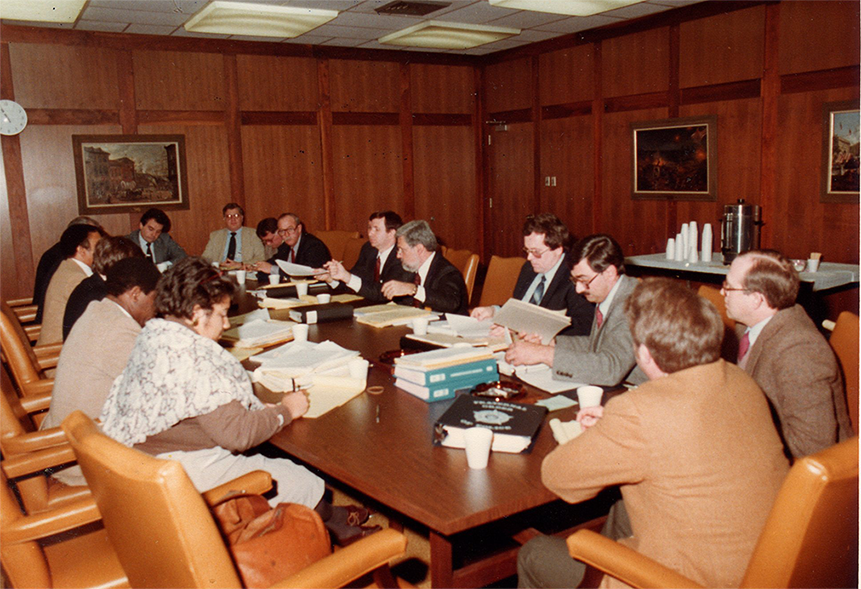 Courtesy Tom Douglas
Courtesy Tom Douglas
Contract Negotians3-15-84
![]()
To Read About the Baltimore Police Strike
Click HERE
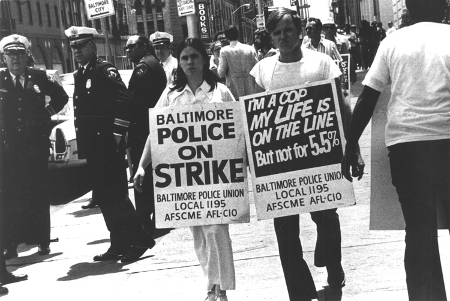

Please contact Det. Ret. Kenny Driscoll if you have any pictures of you or your family members and wish them remembered here on this tribute site to honor the fine men and women who have served with honor and distinction at the Baltimore Police Department.
Anyone with information, photographs, memorabilia, or other "Baltimore City Police" items can contact Ret. Det. Kenny Driscoll at

